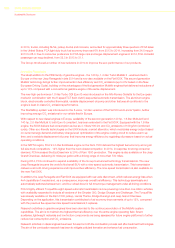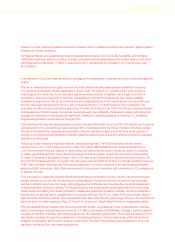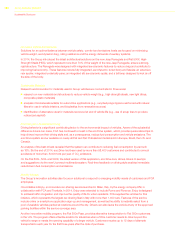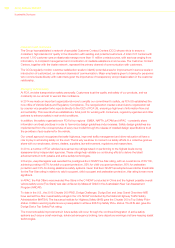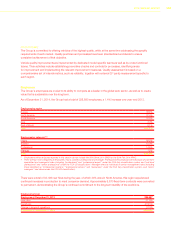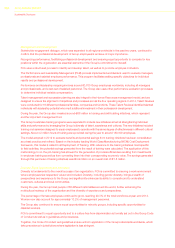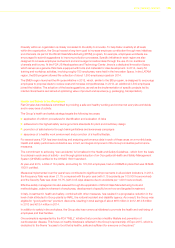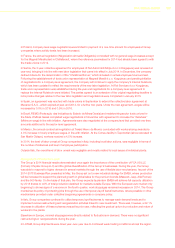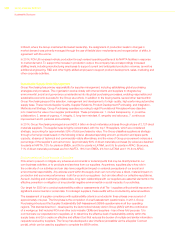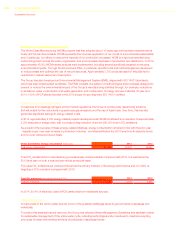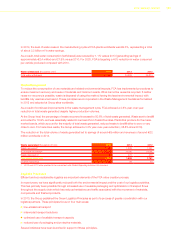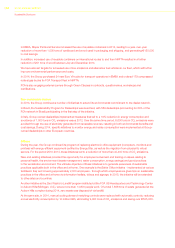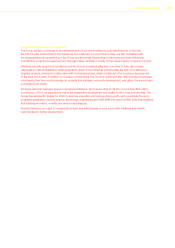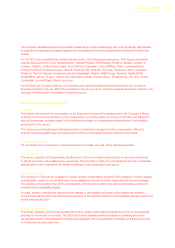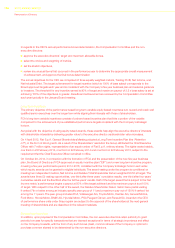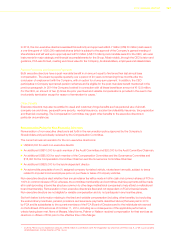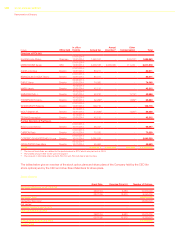Chrysler 2014 Annual Report Download - page 130
Download and view the complete annual report
Please find page 130 of the 2014 Chrysler annual report below. You can navigate through the pages in the report by either clicking on the pages listed below, or by using the keyword search tool below to find specific information within the annual report.
128 2014 | ANNUAL REPORT
Sustainability Disclosure
In Brazil, where the Group maintained its market leadership, the realignment of production levels to changes in
market demand was primarily managed through the use of flexible labor mechanisms and reorganization of shifts, in
agreement with the unions.
In 2014, FCA US increased vehicle production through revised operating patterns at its NAFTA facilities in response
to market demand. To support the increase in production output, the company has correspondingly increased
staffing levels, including manufacturing employees to support current and anticipated production volumes, as well as
additional engineering, R&D and other highly-skilled employees to support product development, sales, marketing and
other corporate activities.
Sustainable Supply Chain Management
Group Purchasing has primary responsibility for supplier management, including establishing global purchasing
strategies and processes. The organization works closely with internal clients and suppliers to integrate key
environmental, social and governance considerations into its global purchasing processes, enabling responsible and
sustainable economic success for the Group as a whole. In addition to the buying teams, several other teams within
Group Purchasing support the selection, management and development of a high-quality, high-performing automotive
supply base. These include Supplier Quality, Supplier Relations, Product Development Purchasing, and Integration,
Methods and Strategy. Group Purchasing operates according to eight Foundational Principles whose objective
is to maximize the value of our supplier partnerships. These principles are: 1. mutual transparency, 2. proactive
collaboration, 3. sense of urgency, 4. integrity, 5. long-term mindset, 6. empathy and advocacy, 7. continuous
improvement and 8. personal accountability.
In 2014, Group Purchasing managed around €53.4 billion in direct materials purchases through a base of 3,127 direct
materials suppliers. The supplier base is highly concentrated, with the top 176 suppliers, which are considered
strategic, accounting for approximately 59% of total purchases by value. The Group classifies suppliers as strategic
through a formal process based on the following criteria: allocated spending amount, production and spare parts
capacity, absence of technical and commercially-viable alternatives, and the value of Group procurement orders as a
percentage of the supplier’s annual turnover. Approximately 69% of direct materials purchases (by value) are destined
for plants in NAFTA, 18% for plants in EMEA, and 8% for plants in LATAM, and 5% for plants in APAC. By source,
71% of direct materials purchases are from NAFTA, 16% from EMEA, 2% from LATAM, and 11% from APAC.
Environmental and Social Impacts of Suppliers
FCA aims to prevent or mitigate any adverse environmental or social impacts that may be directly linked to our
own business activities, or to products and services from our suppliers. As partners, suppliers play a key role in
the continuity of our activities and can also have a significant impact on external perceptions of our social and
environmental responsibility. Any adverse event within the supply chain can not only have a direct, material impact on
production and economic performance - both for us and our suppliers - but can also affect our collective reputations.
As such, building and maintaining collaborative, long-term relationships with our suppliers are essential elements in the
effective prevention or mitigation of any potential negative environmental or social impacts of our activities.
Our target for 2020 is to conduct sustainability audits or assessments of all Tier 1 suppliers with potential exposure to
significant environmental or social risks. For strategic suppliers, these audits will be conducted by external auditors.
The assessment of supplier compliance with sustainability criteria is conducted in three phases over a period of
approximately one year. The first phase is the completion of a self-assessment questionnaire. In 2014, Group
Purchasing introduced the Supplier Sustainability Self-Assessment (SSSA) questionnaire in all four operating
regions. This standardized tool - developed by the Automotive Industry Action Group (AIAG) with the contribution
of a workgroup that included FCA and other auto industry OEMs and suppliers - has a three-fold purpose: 1) to
communicate our expectations to suppliers; 2) to determine the effective level of sustainability activity within the
supply base; and 3) to create an effective and efficient tool that reduces the burden of multiple and similar information
requests received by suppliers. The Group has developed a user interface (accessible via the eSupplier Connect
portal), which can be used by suppliers to complete the SSSA online.


